Graduating Teachers Bring a New Dharma Wave
Written by: Barbara Erwine
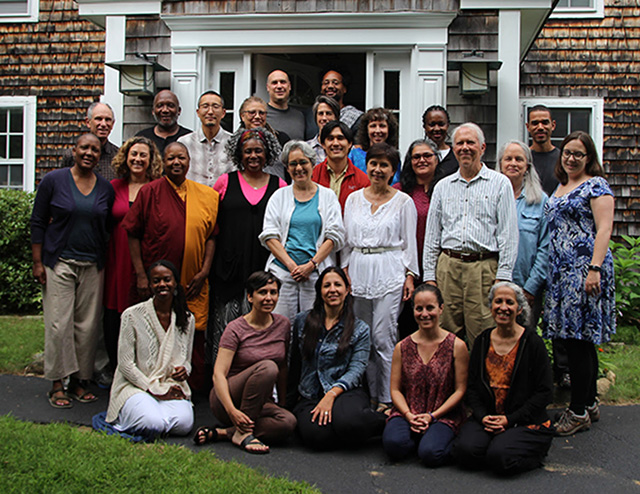
The four Northwest and Western Canada candidates are in this photo of all the teachers-to-be, and their guides, taken at Insight Meditation Society in 2018 at the beginning of the program. The four are, from left: second row, Devon Hase, Vance Pryor and Rachel Lewis; third row, Tuere Sala.
Photos by: Roxanne Dault, Courtesy of IMS, Rachel Lewis
Four new regional insight meditation teachers graduated from the Insight Meditation Society Teacher Training Program in May, bringing new understanding of teaching Buddhist practice to a diverse audience, in an online world.
The four – Devon Hase, Tuere Sala and Vance Pryor from the Pacific Northwest, and Rachel Lewis from Western Canada, are among 20 who graduated. Insight Meditation Society, often referred to as IMS, is located in Barre, Massachusetts.
Like past IMS teacher trainings this program focused on how to prepare talks about the Buddha’s teachings, how to communicate those teachings to a contemporary audience, and how to respond to issues of trauma in the modern world. What distinguished this training from previous trainings was its fostering a more diverse and inclusive community of retreat teachers and meditators.
Seventy-five percent of the participants identified as persons of color, and the group also reflected a broad representation of gender identity, age, country of origin, ethnicity and economic background. The training itself delved deeply into issues of diversity and worked to broaden the voice of dharma in the West.
As Joseph Goldstein (one of IMS’s founding teachers) put it, “This could be a dharma wave—a new dharma wave.”
These were the first teachers who trained during the worldwide suffering of a global pandemic, and the first who were forced online for much of their training.
The trainees at first grieved the loss of in-person contact resulting from the shift to online training, wanting more direct contact and more time to bond.
Lewis said the online technology made it harder to develop the safety and interpersonal connections people needed to deeply explore topics like dharma, race and inclusion. Sala said the pandemic heightened practitioners’ suffering, so trainees offering talks had to quickly learn to hold this intense energy without the benefit of years of teacher experience.
But the trainees also acknowledged the movement to virtual teaching and training had some benefits, opening new opportunities to interact, teach and reach wider audiences without the expense of travel and venue rental.
Pryor said he was surprised how well online teaching worked. He added that the focus on diversity complemented moving online, bringing the dharma to wider audiences and signaling future directions for teaching in the West. The new teachers agreed the online platforms helped blur the line between home and retreat center, bringing the dharma closer to everyday life.
Over the course of writing this article I had the honor of speaking with each of the four new regional teachers, and I’d like to share some of their background, insights and wisdom. They’re listed alphabetically by first name.
Devon Hase
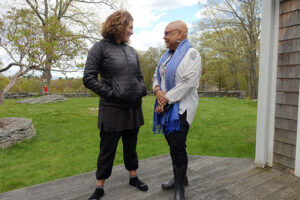
Devon Hase conversing with visiting teacher Ruth King during a break in the training.
Devon Hase started studying dharma around the year 2000, when she was a sophomore in college. After teaching high school for a decade Hase entered a two-year period of retreat, including time at monasteries in Nepal and India.
Currently Hase lives in in her hometown of Ashland, Oregon, in urban retreat with her life partner Nico Hase. Together they wrote the book “How Not to Be a Hot Mess: A Survival Guide for Modern Life.” She practices dharma in insight and vajrayana traditions, and teaches at IMS, Spirit Rock, and throughout North America and Europe.
Here is their shared website, about their dharma and their teaching.
Acknowledging her roots in Oregon, Hase loves practicing in nature and the particular ecosystem of Ashland. She is sensitive to the changes in this region over the years, acknowledging her grief around climate change and the drying of the Rogue Valley near her home.
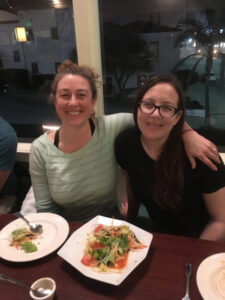
Devon Hase and Rachel Lewis share a meal during the training.
Reminiscing about the training, Hase said the teacher trainees humbled her with the caliber of their dharma practice, life experience, and commitment to being change agents in the world. She honored the effort IMS made to put these issues at the forefront of the agenda, and acknowledged the generous support offered to make the training accessible to the broad cohort of teacher trainees.
Hase recently moved back to Ashland from Hawaii, where she had experienced much cultural and community diversity. This move, and her time in the recent teacher training, helped her see Ashland with new eyes, and to see opportunities for reaching out to the diversity of that community.
The training also clarified her understanding of the work still needed. Hase said this is an exciting time to deepen our understanding of liberation, and how it can bring us together. She sees the future of the dharma as humbling and inspiring, daunting and hopeful.
Rachel Lewis
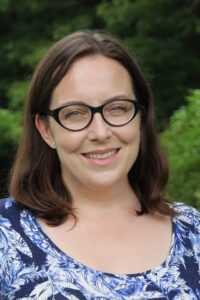
Rachel Lewis teaches in the Vancouver, B.C. region.
Rachel Lewis began practicing meditation while completing her doctorate degree in physics at Yale University. She eventually left physics to follow a path more in line with her heart.
Lewis’ move from physics to more tangible connections to life is like her approach to the dharma – not philosophy for the sake of philosophy, but as a grounded practical guide to living. More information about Lewis is available here.
Although Lewis grew up in Ontario she now teaches in Vancouver, B.C., with strong family ties to Western Canada going back generations. She appreciates how the region’s big trees generate a feeling of being held and supported, in ways that she uses in her practice and teaching.
An eloquent advocate for social justice, Lewis noted how recent incidents of violence against people of color have deepened her understanding that dharma practice and social justice have a reciprocal relationship. As a white-bodied person standing in the fire of social justice work, she finds that putting oneself in the struggle and waking up to the suffering of others is grist for the mill to build a strong dharma practice.
In her view the just-completed teacher training marked several important steps for IMS. In addition to including people with diverse backgrounds, the program also moved away from dominant white-centered training and teaching, to reap the benefits of more inclusive ways of experiencing the world. She noted that the way we teach meditation in the West doesn’t help us look at how the trauma of whiteness constrains our experience of the world.
Lewis expressed appreciation of the “dazzling human beings” in her training cohort, who generated a sense of the potential for much-greater change to come in the dharma community.
Tuere Sala
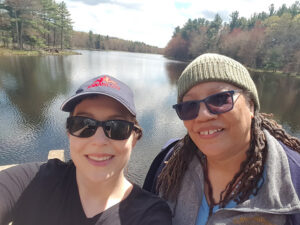
Rachel Lewis and Tuere Sala relax in the sunshine alongside Gaston Pond, near Insight Meditation Society.
Tuere Sala is one of the two co-guiding teachers for Seattle Insight Meditation Society. A retired prosecuting attorney, Sala has practiced vipassana meditation for over 25 years.
For more about Sala, please see her website.
Sala believes urban meditation is the current foundation for practitioners’ path to liberation. Her teaching is accessible, energetic and compassionate, frequently with a touch of humor. In her words, “We’re not trying to stand in the middle of something and know that the situation will pass, we’re trying to stand in the middle of it and know that our overwhelm will pass.”
Sala said this group of new teachers is focused on creating space for diverse voices. The problem with having just one voice, she said, is that it creates the image that the one voice is the dharma. But diversity allows everyone to find their own path to liberation
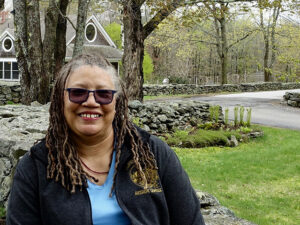
Tuere Sala, on the grounds of the Barre Center for Buddhist Studies.
“When you’re a person of color, how you practice is different and that can be really isolating,” Sala said. “Diverse voices are now normalized and each person can ask, ‘Does this voice resonate with me?’”
Sala also savors the lineage of her own teaching, and the diverse dharma traditions that were represented among the trainees: Mahasi (Burmese), Thai forest, Soto Zen, and Tibetan. She said they all began to harmonize through the wisdom of the Buddhadhamma, and their understandings blended into a strong voice of liberation.
Reflecting on one of the sweeter moments during the training, Sala said she drew on her own cultural heritage to add the gift of an old gospel song, “The Storm’s Passing Over.” The trainees joined together to sing this during times of stress and celebration in the training.
Sala also has been appointed to the Spirit Rock Teachers’ Council.
Vance Pryor
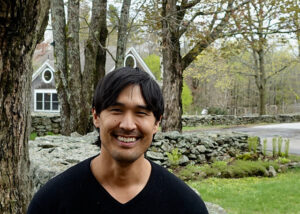
Vance Pryor at the Barre Center.
Vance Pryor, a native of Bainbridge Island, due west of Seattle, has always been interested in the inner life. His practice of insight meditation started at age 16, when he joined a retreat led by teacher Steve Armstrong.
Since then Pryor’s approach to the dharma has been shaped by the teachers he has trained with in the United States and Myanmar. His practice and training have been deeply influenced by the teachings of Sayadaw U Pandita and Sayadaw U Tejaniya, both of whom he spent time with as a monastic, and by the mentorship of Armstrong and teacher Kamala Masters.
Here is more information about Pryor.

Vance Pryor pitches in to wash dishes, after a meal during the training.
In addition to teaching the dharma Pryor has a doctorate in psychology and works as a clinical psychologist. He often uses mindfulness to address difficult experiences in his clinical practice.
Reflecting on the teacher training, Pryor said each trainee also became a trainer, through sharing their experiences of bringing diversity and inclusion to the retreat space. The trainees learned from each other how to bring the teachings to diverse communities, broadening the reach of the teachings internationally. This created a beautiful expression of the dharma through the prism of each teacher-trainee.
During the pandemic Pryor has focused his work online, and he is excited to explore options in the wider world as pandemic and travel restrictions ease.
A Pandemic Ending
As Joseph Goldstein suggests, the teacher training program’s intense expansion to include more diverse teachers and communities, during a unique year of growing online access, may truly represent a wave of transformational change. This new wave is powered by many forces, each adding to the energy of the one before.
These new teachers are part of that wave. They deserve our congratulations and gratitude for their hard work, personal growth, and generosity, as they add their unique teaching voices to a new wave of dharma in the West.
Barbara Erwine practices vipassana meditation, and has participated in Seattle Insight Meditation Society since 2004. She is a past member of the SIMS board of directors, where she served as program director and board president.
